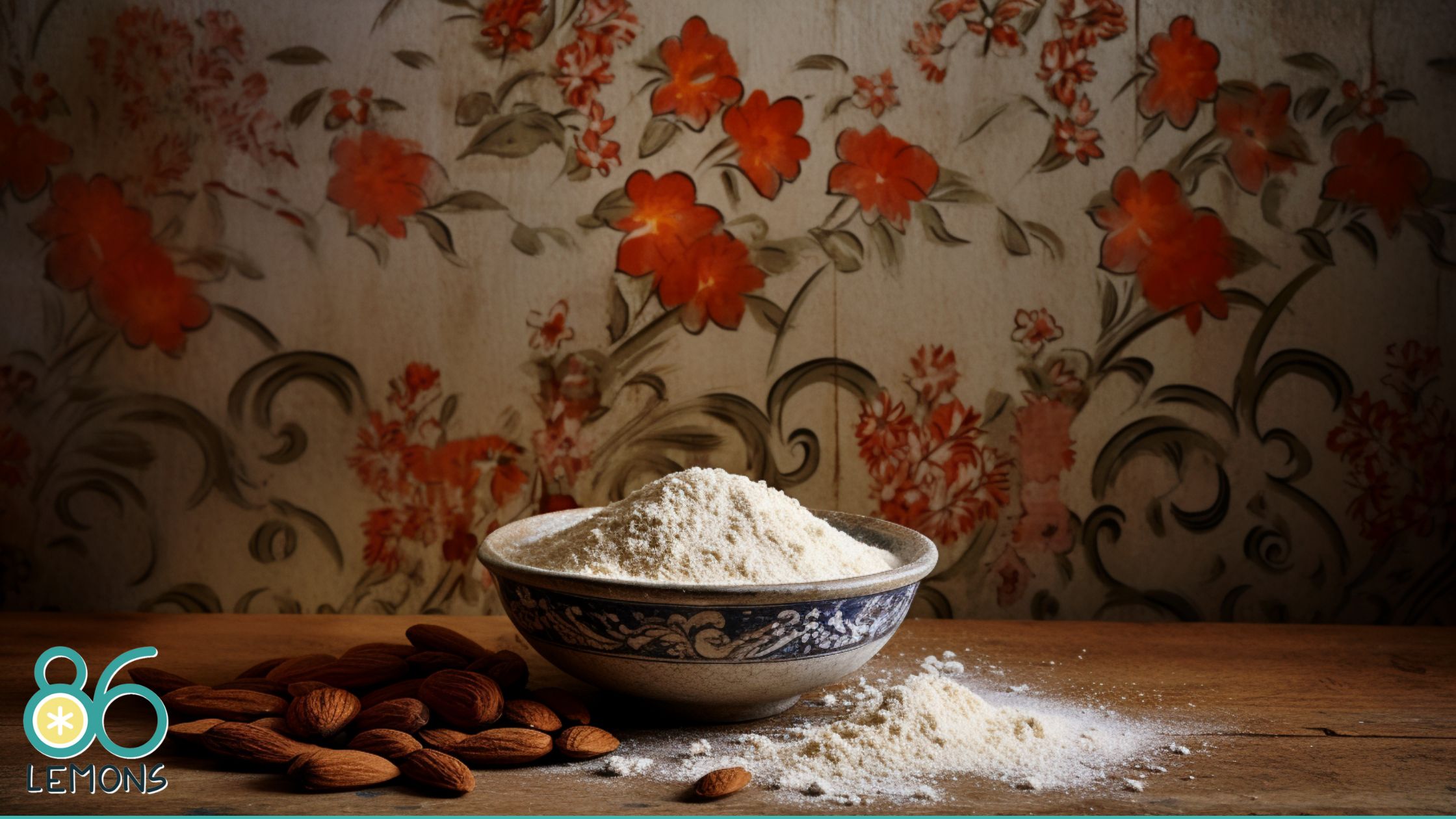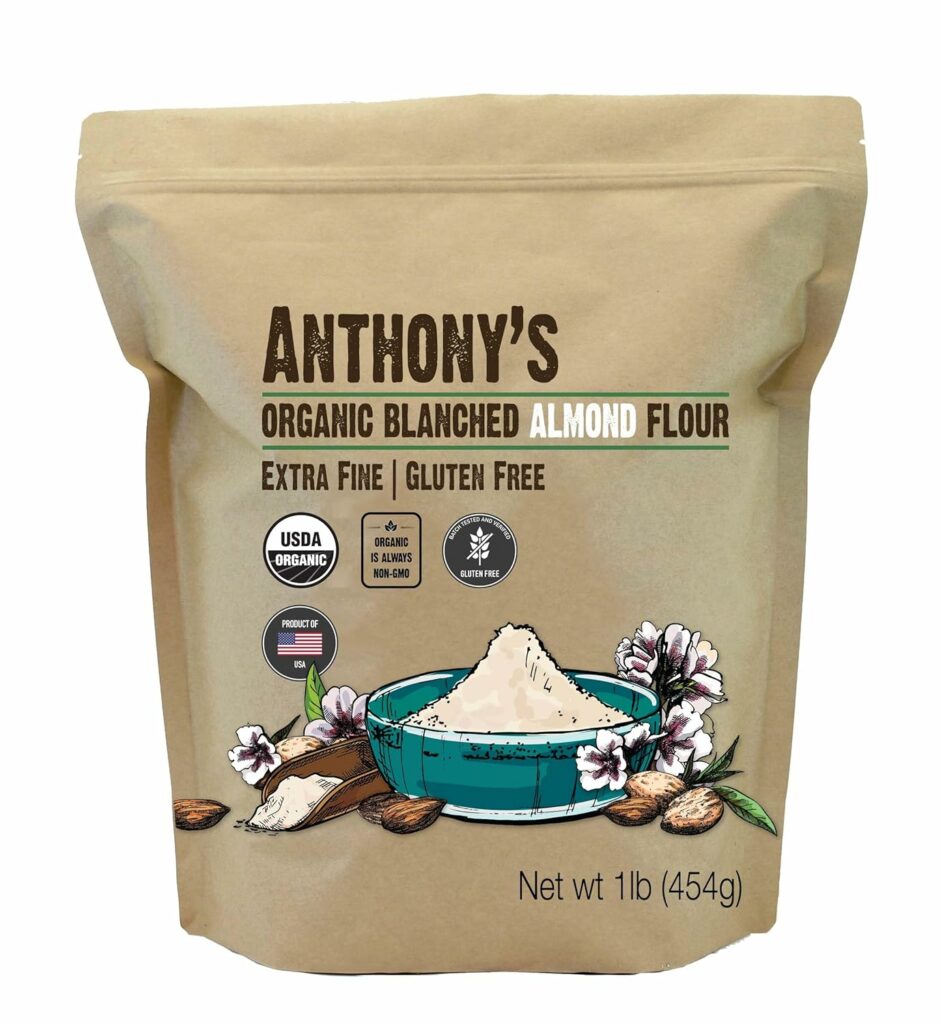Almond flour has swiftly become a staple in many health-conscious and gluten-sensitive households, offering a versatile alternative to traditional wheat flour. Derived from finely ground almonds, this nourishing substitute not only imparts a subtly sweet flavor to baked goods but also enriches them with a boost of protein, healthy fats, and fiber.
From my experience, the best almond flour brands are those that are certified organic, finely sifted, and have a fresh flavor that enhances, rather than overwhelms, vegan recipes. It makes a world of difference in my vegan creations, allowing me to enjoy my favorite treats with none of the guilt.
Through extensive testing and trial in my own kitchen, I’ve identified which almond flours rise above the rest. They offer the ideal blend of nutrition, functionality, and delectable taste, crucial for anyone looking to refine their baking with the goodness of almonds.
Best Almond Flour Brands for Plant-Based Baking
As someone who’s all about that plant-based life, finding the perfect almond flour is a game-changer for my baking adventures. It’s not only a gluten-free option, but it’s also loaded with nutrients and gives a rich, buttery flavor to everything from cookies to crusts.
I’m excited to share my personal picks for the best almond flour that’ll make your vegan treats rise above the rest. Let’s dive into the options that are as good for the planet as they are for your palate.
Blue Diamond’s Finest
If you’re venturing into the realm of gluten-free or paleo baking, this almond flour is a game-changer for your culinary creations.
Pros
- Exceptionally fine texture elevates baked goods
- Large 3lb bag is economical and lasts longer
- Supports healthy, gluten-free living seamlessly
Cons
- Bag resealability can be a nuisance
- Slightly coarser than some ground at home
- Pricey compared to other flours on a per-pound basis
Just tried whipping up some vegan brownies with this almond flour, and I’m thoroughly impressed by how well they turned out. The flour’s fine texture allowed for a smooth and rich taste, enhancing the overall quality of the brownies.
Using this flour felt like I had a professional bakery right in my kitchen. I’ve tested quite a few almond flours in my time, and this one mixes beautifully with other ingredients without creating that gritty texture some others leave behind.
And the fact that it’s gluten-free? It means I can indulge without worry, and so can my friends with dietary restrictions. Plus, it’s kind to the planet, aligning perfectly with my vegan lifestyle.
While the bag did give me some trouble with sealing after use, it’s nothing a good clip can’t handle. Don’t let the price deter you; consider it an investment in your health and taste buds!
Anthony’s Premium Almond Flour
This almond flour is a staple in my kitchen, perfect for those who are health-conscious and love to bake.
Pros
- Finely ground texture perfect for baking
- Enhances flavor with natural almond taste
- Supports a plant-based lifestyle
Cons
- A bit pricier than some competitors
- May clump if not stored properly
- Not suitable for those with nut allergies
Having recently whipped up a batch of vegan cookies, I noticed how effortlessly Anthony’s Almond Flour blended with the other ingredients. It’s smooth and doesn’t leave you with that grainy texture some flours can, making it my go-to for delicate recipes like macarons. Its rich, nutty essence brought my cookies to a whole new level of yum.
I typically follow a plant-based diet, so I’m always on the lookout for animal-friendly products that don’t skimp on quality. Anthony’s Almond Flour has become a cherished find. It’s not only vegan and gluten-free but also free from preservatives, aligning beautifully with my environmentally conscious values.
Inviting friends over and baking with this almond flour is always a joy. The results? They’re impressed by how indulgent vegan treats can taste. With this flour, I feel good about the treats I’m sharing, knowing they’re nourishing and made from nature’s goodness. It’s a health-conscious choice for anyone keen on maintaining a balanced, plant-based diet.
Bob’s Red Mill Super-Fine Almond Flour
I just whipped up some vegan cookies with this almond flour, and I’m convinced it’s a pantry must-have for health-conscious bakers.
Pros
- Lends a deliciously rich and buttery flavor to baked goods
- Its fine texture gives a smooth finish to everything from cookies to cakes
- Certified gluten-free, ideal for those with gluten sensitivities
Cons
- More expensive than traditional wheat flour
- Needs more binding agents in recipes due to lack of gluten
- High in calories, which could be a concern for some diets
My first impression of Bob’s Red Mill Almond Flour in my vegan baking was how well it incorporated with my other ingredients. The consistency was just perfect for creating a smooth batter, and I didn’t experience any graininess that can sometimes happen with nut flours.
Taste-wise, the difference was palatable. It gave my cookies a rich, buttery flavor without any dairy, aligning perfectly with my vegan preferences. Not only does the flour taste great, but I also felt good knowing it’s non-GMO and provides a good source of vitamin E.
One thing I kept in mind was the almond flour’s moisture-absorbing qualities. I had to tweak my usual recipes slightly, adding a tad more liquid to achieve the perfect dough consistency. But once I got the hang of it, baking with this flour was a breeze.
Sustainability is important to me, and I appreciate that this almond flour comes from California-grown almonds. Supporting a company that values high-quality, safe, and wholesome ingredients is a bonus, and it shows in every baked treat I make. Despite the price, which is a bit more than I’d typically spend, this flour’s versatility and health benefits make it a staple in my kitchen.
Wholesome Yum Almond Flour
For those aspiring to create mouthwatering baked goods with a health-conscious twist, I’d say Wholesome Yum Almond Flour is a game-changer, enhancing every recipe I’ve tried.
Pros
- Gives recipes a rich, smooth texture
- Perfect for low-carb and keto-friendly diets
- Sustainably made in the USA from single-ingredient almonds
Cons
- Pricier than some traditional flours
- Can clump if not stored properly
- Not suitable if you have an almond or nut allergy
This almond flour has revolutionized my baking regime. Just yesterday, I whipped up a batch of vegan cookies that were astonishingly tender, thanks to this flour’s super fine consistency. Blending seamlessly, it offered that desirable homogenous texture that so often eludes gluten-free options.
I have peace of mind, too, knowing it’s crafted from premium California almonds without any GMOs. My keto friends are thrilled every time I serve them a treat made from this; the low-carb count fits right into their nutritional plans without compromising on taste or satisfaction.
Its versatility astounds me; whether I’m creating a crust for my vegan pies or thickening a hearty stew, this flour never fails. It’s a staple in my pantry for its ability to mimic the properties of traditional flour while supporting my plant-based lifestyle.
The slight uptick in cost compared to other flours is noticeable, but for the benefits it offers, I consider it a worthwhile investment in my health and culinary enjoyment.
Herbaila Almond Flour
If you’re on the hunt for a versatile, keto-friendly baking staple, I’d say the Herbaila Almond Flour is definitely worth considering.
Pros
- Enhances baked goods with a rich, nutty flavor
- Perfectly fine texture for a smooth, consistent bake
- Supports a range of dietary preferences: gluten-free, vegan, and paleo
Cons
- Can be pricier than traditional flour
- May require recipe adjustments to achieve desired consistency
- Nut allergies make it a non-option for some
I recently used the Herbaila Almond Flour, and I must say, the flavor was on point. The richness of the almonds added a depth that traditional flour just can’t match. With it being not just vegan but also keto and paleo-friendly, it’s an amazing option for those mindful days when I’m trying to keep things clean and green.
I’ve noticed it tends to make my baked treats more moist and tender – a win in my book. There’s a definite learning curve when substituting it for wheat flour, but once you get the hang of it, the smooth texture it lends to recipes is incomparable. Plus, the added nutritional benefits of almonds are a bonus.
However, it’s not without its drawbacks. The cost can be a bit steep compared to other flours, so I have to budget for it. Additionally, while I don’t mind tweaking my recipes, not everyone might enjoy that experimentation. And, of course, for my friends with nut allergies, this flour is a no-go.
But if you’re like me and value quality ingredients that align with a compassionate, plant-based lifestyle, Herbaila Almond Flour is definitely worth trying out in your next kitchen adventure.
Anthony’s Organic Almond Flour
If you’re on the hunt for a healthy baking alternative, trust me, Anthony’s Organic Almond Flour is a top contender.
Pros
- Super fine texture, perfect for delicate pastries
- Organic and gluten-free, a dream for the health-conscious
- Delivers on versatility, fabulous in both sweet and savory recipes
Cons
- A bit on the pricey side compared to regular flour
- Not suitable for those with nut allergies
- Only comes in 1 lb packages, larger sizes would be handy
I recently got my hands on Anthony’s Organic Almond Flour, and I’ve been nothing short of impressed. For anyone dabbling in the vegan lifestyle or just aiming to eat cleaner, this flour is a kitchen must-have. Its ultra-fine texture has made my baking experiments—be it fluffy muffins or crispy cookies—a resounding success.
The fact that it’s both USDA-certified organic and gluten-free adds to my peace of mind. It’s evident that Anthony’s doesn’t cut corners; the purity of this almond flour shines through, enhancing but never overwhelming my creations. You can literally taste the quality.
The only snag I’ve run into is the cost, which can stretch the wallet more than conventional flour. And, of course, if you’re avoiding nuts, you’ll have to pass on this one. It’s also a tad inconvenient that I can’t stock up on larger quantities—though maybe that’s just me being wishful for having more of a good thing.
However, using this almond flour feels like a step in the right direction for a sustainable, plant-based diet that doesn’t compromise on taste or quality. And when I think about the environmental footprint, I can’t help but feel good about my choice.
Nature’s Eats Fine Almond Flour
If you’re aiming for a healthier baking alternative, this almond flour is a must-try for its quality and versatility.
Pros
- Enhances flavor and nutrition in recipes
- Perfect for gluten-free and low-carb diets
- Finely milled for smooth textures
Cons
- Pricier than traditional flour
- May clump if not stored properly
- Strong almond flavor might not suit all dishes
I’ve recently tried Nature’s Eats Almond Flour and I’m impressed. The flour blended seamlessly into the dough, and the baked cookies had a delightful, light texture. What’s remarkable is the way it enriches each bite with a subtle, nutty taste, giving treats an extra flavor dimension that you don’t get with regular flour.
Crafting a vegan chocolate cake was a joy with this almond flour. It’s reassuring to know that what I’m baking is not only cruelty-free but also packed with a protein punch. And I didn’t have to worry about the gluten-intolerant folks missing out, as this flour is a game-changer for them too. Although the price point is a little higher, the benefits it brings to the table make it well worth the investment.
Storing this gem requires a tad more care, as moisture could lead to clumping. Surprisingly enough, the strong almond flavor meshes well with most of my recipes, though I admit it might overpower milder flavors in some dishes. Yet, all considered, this almond flour lies at the heart of my kitchen’s transformation towards healthier, vegan-friendly, and inclusive baking.
READ NEXT: Best 9 x 13 Baking Pans to Rock Your Kitchen in 2024
Buying Guide
Almond Flour Types
When I shop for almond flour, I first look at the types available. There are usually two main kinds: blanched almond flour and unblanched almond flour.
Blanched almond flour is made from almonds that have had their skins removed, resulting in a finer texture. On the other hand, unblanched almond flour includes the skins, giving it a coarser texture and more fiber.
Texture and Consistency
The next thing I consider is the texture and consistency of the almond flour. For most of my baking, I prefer a fine, powdery consistency as it yields a smoother and more cohesive result.
- Fine/grain size: Ideal for cakes, cookies, and bread.
- Coarse/grain size: Better for recipes where a denser texture is desired.
Freshness and Flavor
I also take into account the freshness and flavor. Fresh almond flour should smell sweet and nutty. If it smells sour or rancid, it’s likely gone bad. Since almond flour can spoil, I always check the best-before date or the packing date.
Purity
Moreover, purity is important. I look for almond flour that is free from additives and fillers. It should be purely ground almonds, nothing else. This is better for anyone pursuing a vegan diet, as no animal-derived products or unnecessary ingredients are involved.
| Criteria | What to Look For |
|---|---|
| Type | Blanched or unblanched based on preference |
| Texture | Fine or coarse as needed by the recipe |
| Freshness | Sweet, nutty aroma; check best-before date |
| Purity | No additives or fillers; 100% almonds |
Packaging
Lastly, I look at the packaging. It should be sealed well to maintain freshness and, if possible, be resealable. I prefer packaging that is sustainable and doesn’t involve unnecessary plastic.
- Recyclable/resealable bags: Good for freshness and the environment.
- Plastic containers: Ensure a tight seal but consider eco-friendliness.
Choosing the best almond flour involves considering these factors, ensuring that what I purchase is aligned with both my baking needs and my vegan lifestyle, all while supporting sustainability.
Interested in learning more? Check out the best vegan yogurt next!









